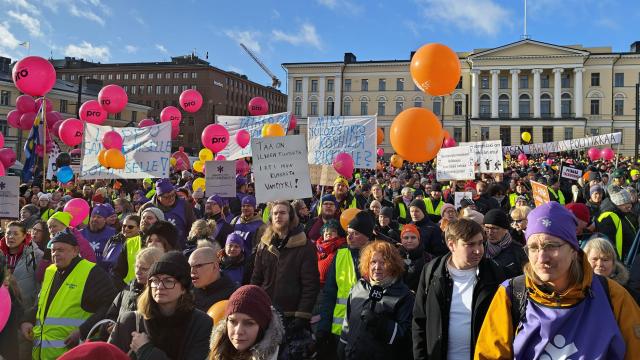The President of UNI, Maj-Len Remahl: Fair play in globalisation
A decent minimum standard of living, the recognition of human rights, fundamental trade union rights and a respect for the environment, together form the framework for which the international trade union movement is calling in connection with the expansion of globalisation.
The globalisation of the economy cannot move forward in a positive way by solely giving satisfaction to corporate profit seeking, says Ms Maj-Len Remahl, who was recently elected as the President of UNI, the Union Network International.
This truly international umbrella organisation, with over one thousand affiliated trade unions as members and the representative of a total membership of some 16 million people, elected a Finnish woman President in early September. Ms Maj-Len Remahl has had the opportunity to acquire experience for this task, and to make female history, by working for some twelve months as the President of FIET, the International Federation of Commercial, Clerical, Professional and Technical Employees. When four international trade union organisations were merged last year to form UNI, the new organisation was initially led, through the transitional period, by Kurt van Haaren of Germany. The leadership has now been entrusted to a pair of Finnish hands.
Ms Maj-Len Remahl accepted the position with pride, which was not without good reason, as no other Finnish trade union leader has ever been presented with the responsibility of holding the reins of such a large international organisation. And of course, Ms Remahl is an encouraging example for every other woman in the world.
- Improving the position of women is one of my most important tasks. My election as President is an indication that an international organisation may equally well be led by either a man or a woman, announced Ms Remahl. Her presidency will last for a two year period, during which time her main task will consist of welding together the four organisations which have been merged to form the new UNI. Ms Remahl has previously acquired some sound experience in Finland of the type of work which is required for the harmonisation of a new entity after such a merger. She was the President of the SAK affiliated Commercial Workers' Union at the time that two separate unions, both of which represented retail workers in Finland, were merged 14 years ago, and only last year she was involved in another merger which will remain in the history books of the Finnish trade union movement, which was the occasion that four SAK affiliated unions were merged into a single, new service sector union, namely PAM, the Service Unions United. Ms Remahl will continue to lead PAM until her retirement from the post at the end of the year 2002.
- My period as the President of UNI will last until the summer of 2003. This means that I will have a soft landing into retirement as I can continue in my international role for a little while after leaving my main occupation, Ms Remahl says.
Swedish is one of the official languages of UNI and is the mother tongue of Ms Remahl, who also speaks English.
Globalisation has changed the lives of workers
The globalisation of the economy is evident in the everyday lives of workers, in Finland as it is everywhere else. The most tangible change, in the opinion of Maj-Len Remahl, is the transfer of the ownership of many companies to very often faceless, international shareholders, and a group of companies is now typically composed of numerous separate entities which may operate in different corners of the world.
- When these huge conglomerates announce that they are going to reduce their workforce, their employees in a variety of countries are left in fear and uncertainty as they do not know whether or not they will be affected by the forthcoming redundancies. This presents a serious challenge to the international trade union movement, as workers in the various parts of the world are compelled to compete for jobs. Such competition should never be based on social dumping. It is the goal of UNI, and of the entire international trade union movement, to create fair rules of play in relation to globalisation. A decent minimum standard of living, trade union rights, human rights and a clean environment should be ensured for each and every person, throughout the entire world."Ms Remahl adds, with emphasis, that globalisation cannot move forward in a positive manner by solely satisfying the profit seeking motives of the big multinational companies.
Globalisation means that the trade union movement must itself become more international, and particularly so at the grass roots level. In practice this requires cross-border communication between the various representatives of the workers of the multinational companies.
- International communication has become an everyday feature for many shop stewards and for health and safety representatives. This also applies to trade union officers and to other staff. The representation of the interests of the workers no longer ceases to operate at the national borders of any country, Ms Remahl points out.
- It is a task of UNI to assist the unions in building cooperation networks amongst themselves and to help them to draft minimum terms and conditions of working. The strengthening of unionisation is one of our major tasks, as only a strong international trade union movement can act as a counterbalance to globalisation."
Although, on a world wide basis, there are some 16 million employees under the umbrella of UNI, the true membership could be multiplied many times.
- For example, unionisation has a long history in the media sector, in Finland and elsewhere, and the rate of unionisation in the banking sector is high even in many of the developing countries. However, unionisation in the remainder of the private service sector is poorly organised in various parts of the world, and this will present a lot of work for UNI, Ms Remahl says.
Attac and the trade union movement share aims
Attac, as an organisation, has drawn a lot of attention to itself for its criticism of international capitalism. A branch of Attac is established in Finland.
- The international trade union movement demanded, several years prior to the foundation of Attac, that the debts of the developing countries should be wiped clean and that the development of globalisation should be approached from a more humane angle. I am pleased that new civic movements have appeared and are making the same demands as those of the trade union movement."
- The trade union movement has various channels of influence on the national, European and international levels.
Openness benefits women
Women and children in the developing countries are frequently the victims of globalisation, and even in the western industrialised world it is women who are the first to lose their jobs, and thus their pay-packets, when work is transferred to a country in which labour is cheap. Maj-Len Remahl points out that whilst women are treated poorly as a result of globalisation, it has always been women who have had to bear the brunt, whatever model may have been prevalent in world trade.
- The development of equal opportunities for women will be improved however, when national borders are opened, networks are created and international communication is established. Information on the position of women in the different parts of the world is nowadays transmitted in a much more rapid manner than hitherto and the trade union movement is thus in a better position to be able to help.
- Openness is a far better alternative to closing national borders, when the development of the position of women is at stake, Ms Remahl says, and refers to countries under extremist dictatorships.
Transparency and openness are also prerequisites for a successful control over the implementation of, for example, the ILO convention on the abolition of child labour.
News
 The Central Organisation of Finnish Trade Unions
The Central Organisation of Finnish Trade Unions

